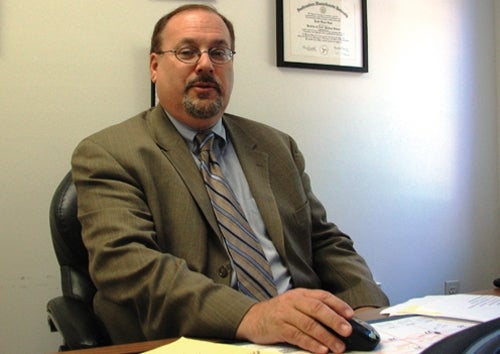The age of specialization has virtually extinguished the sole legal practitioner who ‘does it all.’ But many solos are surviving or even thriving now by cultivating a recession-proof niche or complementary practice areas that can balance out during economic pendulum swings.
David Lima of Southborough, who handles real estate and bankruptcy matters, has maintained a steady flow of work despite the volatile economy. “Bankruptcy work is picking up quickly [while] my real estate work is going down,” said Lima, noting that his schedule of real estate closings has dropped from roughly 12 per month to three while bankruptcy filings have rebounded to near record levels.
“This is the most difficult time for real estate lawyers in nearly 20 years,” said Jill Natola of Leominster. “There is still some business out there, but every closing is a problem child,” she asserted, noting that lawyers must obtain approvals from unhappy lenders, dispose of takings and lien attachments, or deal with foreclosure and appraisal problems in order to get a deal done.
“It leaves you feeling like an emergency room physician treating the critically wounded,” said Natola, who added that many banks are balking at transaction approvals. “Often they won’t approve a sale that leaves them $20,000 short of principal repayment, but then they go through foreclosure and have to take $50,000 less,” she remarked
Natola manages a profitable office by supplementing her real estate work with domestic relations and family matters. “You have to react to what people need, and times of economic stress seem to increase the volume of family issues that need legal attention,” she asserted.
Thomas Manning of Worcester similarly supplements his real estate work with litigation and estate probation matters. “The litigation work is almost always out there, and people have disputes even when times are bad, but you have to restrict the kinds of matters you take or it can suck up all of your time,” he commented.
Recession-Proof
The time and expense of litigation is a selling point for Joanna Cobleigh’s work in mediation and collaborative law. The Springfield lawyer handles matters for clients in Hampden County and Central Massachusetts who want an alternative method of resolving disputes. “Some people can’t afford a long drawn out legal battle or they’re afraid of a scene with lawyers shoving each other and throwing papers around the room,” she added.
That is why Cobleigh sees more parties turning to mediation, particularly for divorce. “Particularly now, some people can’t afford a divorce in court, but in mediation they share costs and work together to resolve issues more quickly and at lower cost.” Cobleigh also touts the cost-savings of collaborative law, which involves two parties represented by lawyers who are pledged to amicable resolutions and trained in non-adversarial negotiations.
Some solos even say they are busier in hard times. Michael Badger of Worcester, who handles employment law matters, said that management clients are always concerned with proactive training on tricky legal issues, but often need legal advice regarding workforce reductions in down times. He added that “[adversarial] employment law claims also seem to be counter-cyclical, so I have never experienced a slow-down.”
In addition, Badger gets plenty of referrals from big-firm lawyers who know that he offers big-firm niche experience at solo prices and does not compete with them to be a full-service provider.
Criminal defense lawyer Margaret Guzman of Worcester, who handles the defense of serious felonies, asserted that “there is sadly more work in down times for criminal lawyers” as well. But she adds that the competition is stiff for clients who can afford to pay for their own lawyers, noting that court-appointed work for indigent clients still only pays $50 per hour in district court and $60 per hour in superior court. Being one of fewer than 20 lawyers approved to do court-appointed murder cases in Worcester County, she can make $100 per hour for that kind of work.
Competing In A Tough Economy
Kristina Vickstrom of Worcester offers many of the same estate planning and elder care legal services that larger firms do. “I don’t have the overhead costs of a large firm, and that is reflected in my pricing and hourly fees,” she asserted. “I can also offer that personal touch and form the trust that is important in any attorney-client relationship,” Vickstrom added.
That personal touch means traveling to clients’ homes when they might be elderly or have special needs. “About one quarter of my clients will request this service, and if they live in Worcester I charge no travel fee,” she said.
Lima has also used “the personal touch” to compete, traveling to meet clients after hours or on weekends if necessary. “The client is a customer and the customer is king in a service business,” he said, noting that his service objective is “to change the way that people think about attorneys.” Lima said he is also “casting a wider geographic net now” to reach out to more prospective clients with his message.
“I also moved from Framingham to Southborough, and that resulted in a huge cost savings,” said Lima, who noted that he keeps overhead low for competitive pricing.
Badger asserted that solos “can expand work capacity without expanding headcount by investing in efficiency that comes from affordable technologies now.”
Lima invests in technology for competitive advantage as well, utilizing specialized software to sort and search data and to generate documents efficiently for real estate closings and bankruptcy filings. “I also have a web site with a blog, I have been working on search engine optimization for my site, and I’ll be adding video soon.”
Lima added that social networking technology also facilitates virtual meetings, exchange of information and referrals without the expense of leaving the office. “Lawyers have been slow in adopting these tools, but I think it pays to learn how to use them,” Lima concluded.
John Cunningham is a freelance writer based in Natick.

